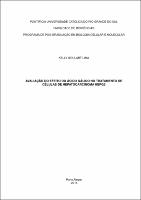| Share record |


|
Please use this identifier to cite or link to this item:
https://tede2.pucrs.br/tede2/handle/tede/5495| Document type: | Dissertação |
| Title: | Avaliação do efeito do ácido gálico no tratamento de células de hepatocarcinoma HEPG2 |
| Author: | Lima, Kelly Goulart  |
| Advisor: | Oliveira, Jarbas Rodrigues de |
| Abstract (native): | O Carcinoma Hepatocelular é o tumor hepático primário mais prevalente e está entre as dez principais neoplasias que afetam a população mundial. O seu desenvolvimento está relacionado, na maioria das vezes, a uma lesão hepática crônica, como ocorre na cirrose. As terapias consideradas curativas atualmente são somente a ressecção cirúrgica, o transplante e a ablação percutânea, ainda com possibilidade de recidiva. Nesse contexto, a busca por novas alternativas terapêuticas para a doença torna-se um campo de pesquisa em expansão. O conhecimento sobre a correlação entre a inflamação crônica e cãncer tem impulsionado novas pesquisas com agentes anti-inflamatórios que apresentem potencial para o desenvolvimento de drogas antitumorais. O ácido gálico é um polifenol encontrado em vários produtos naturais, o qual tem apresentado atividade anti-inflamatória, antitumoral, antimutagênica e forte ação antioxidante. O objetivo desse estudo foi avaliar o efeito do ácido gálico sobre a proliferação celular e parâmetros inflamatórios das células de carcinoma hepático (HepG2), assim como investigar os mecanismos envolvidos. A viabilidade celular foi avaliada através do ensaio colorimétrico MTT e contagem celular por exclusão com Azul de Trypan. Os resultados mostraram que o ácido gálico reduziu a proliferação celular de maneira dose e tempo dependente, sem causar necrose (ensaio LDH). Observamos indução significante da apoptose através do ensaio PE Annexin V and 7-AAD e nenhuma interferência no ciclo celular utilizando o kit FITC BrdU Flow. Os níveis de mediadores inflamatórios foram medidos utilizando o kit Cytometric Bead Array Human Inflammation. Observamos redução significante nos níveis da interleucina 8 (pró-inflamatória e relacionada à angiogênese, invasividade e metástases), aumento dos níveis de interleucina 10 (anti-inflamatória e relacionada à morte celular programada) e aumento dos níveis de interleucina 12 (antiangiogênica e antimetastática). Nós também avaliamos os níveis de TGF(3 por ELISA (Enzyme¬Linked lmmunosorbent Assay) e não observamos diferenças significativas. A partir desses resultados, acreditamos que o ácido gálico tem forte potencial como agente antitumoral. |
| Abstract (english): | Hepatocellular Carcinoma is the most prevalent primary tiver tumor and is among the top ten cancers that affect the world population. lts development is related, in most cases, the existente of chronic tiver injury, such as occurs in cirrhosis. Current curative therapies are only surgical resection, transplantation and percutaneous ablation, however with the possibility of recurrence. In this context, the search for new therapies for the disease becomes an interesting field for research. The knowledge about the correlation between chronic inflammation and cancer has driven new researches with anti-inflammatory agents that have potential for the development of antitumor drugs. Gallic acid is a polyphenol found in many natural products and have shown anti-inflammatory activity, anti-tumor, antimutagenic and strong antioxidant action. The purpose of this study was to investigate the effect of gallic acid on cell proliferation and inflammatory parameters of tiver carcinoma cells (HepG2), as well as to investigated the mechanisms involved. Cell viability was evaluated through MTT colorimetric assay and Trypan blue exclusion. Results showed that the gallic acid decreased proliferation of HepG2 celis in a dose and time dependent manner, without causing necrosis (LDH assay). We observed significant induction of apoptosis by PE Annexin V and 7-AAD assay and no interferente with the cell cycle using the FITC BrdU Flow Kit. The leveis of inflammatory mediators were measured by Cytometric Bead Array Human Inflammation Assay and observed a significant reduction in the leveis of interleukin-8 (pro-inflammatory and related to angiogenesis, invasiveness and metastasis) and increased leveis of interleukin-10 (anti-inflammatory and related to the induction of programmed cell death) and interleukin-12 (antiangiogenic and antimetastatic). We also evaluated the leveis of TGF by ELISA (Enzyme-Linked lmmunosorbent Assay) and no significant differences. According to these results, we believe that gallic acid has a strong potential as an anti-tumor agent. |
| Keywords: | BIOLOGIA CELULAR BIOLOGIA MOLECULAR ÁCIDO GÁLICO CÉLULAS CARCINOMA HEPATOCELULAR NEOPLASIAS |
| CNPQ Knowledge Areas: | CNPQ::CIENCIAS BIOLOGICAS::BIOLOGIA GERAL |
| Language: | por |
| Country: | BR |
| Publisher: | Pontifícia Universidade Católica do Rio Grande do Sul |
| Institution Acronym: | PUCRS |
| Department: | Faculdade de Biociências |
| Program: | Programa de Pós-Graduação em Biologia Celular e Molecular |
| Citation: | LIMA, Kelly Goulart. Avaliação do efeito do ácido gálico no tratamento de células de hepatocarcinoma HEPG2. 2014. 57 f. Dissertação (Mestrado em Biologia Celular e Molecular) - Pontifícia Universidade Católica do Rio Grande do Sul, Porto Alegre, 2014. |
| Access type: | Acesso Aberto |
| URI: | http://tede2.pucrs.br/tede2/handle/tede/5495 |
| Issue Date: | 18-Feb-2014 |
| Appears in Collections: | Programa de Pós-Graduação em Biologia Celular e Molecular |
Files in This Item:
| File | Description | Size | Format | |
|---|---|---|---|---|
| 459268.pdf | Texto Completo | 1.06 MB | Adobe PDF |  Download/Open Preview |
Items in DSpace are protected by copyright, with all rights reserved, unless otherwise indicated.




